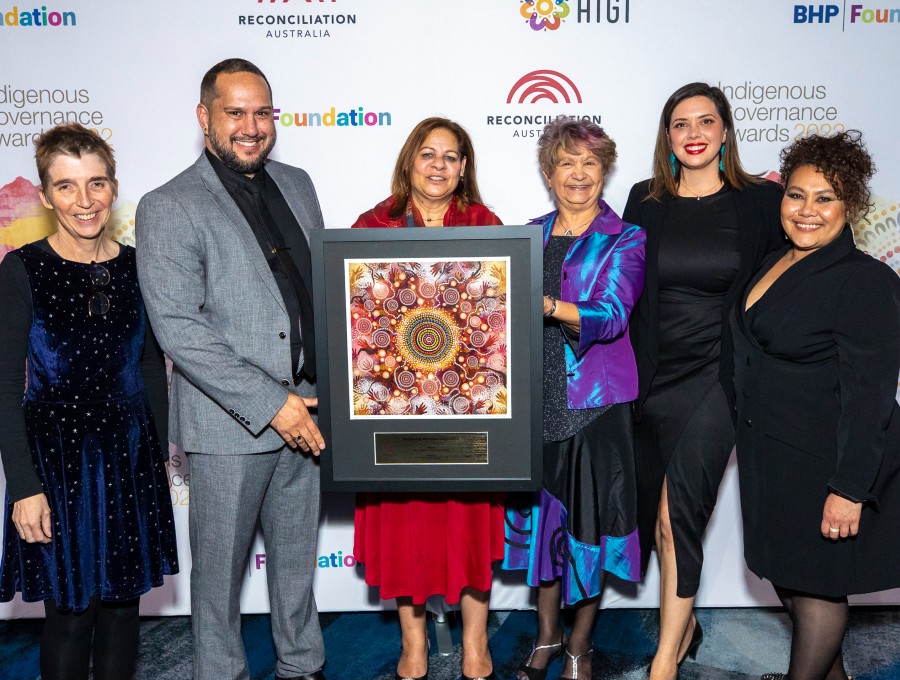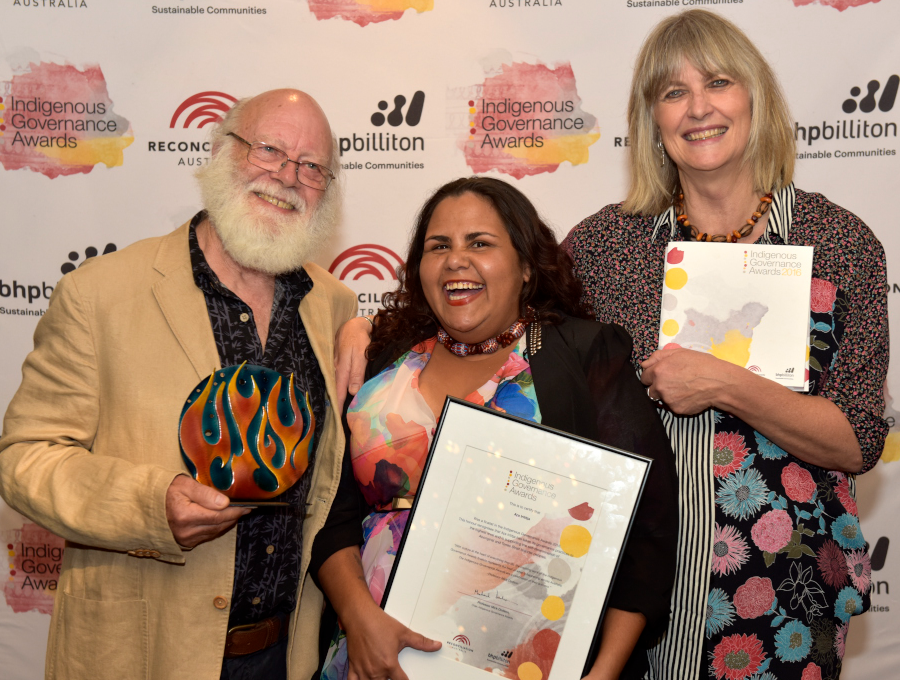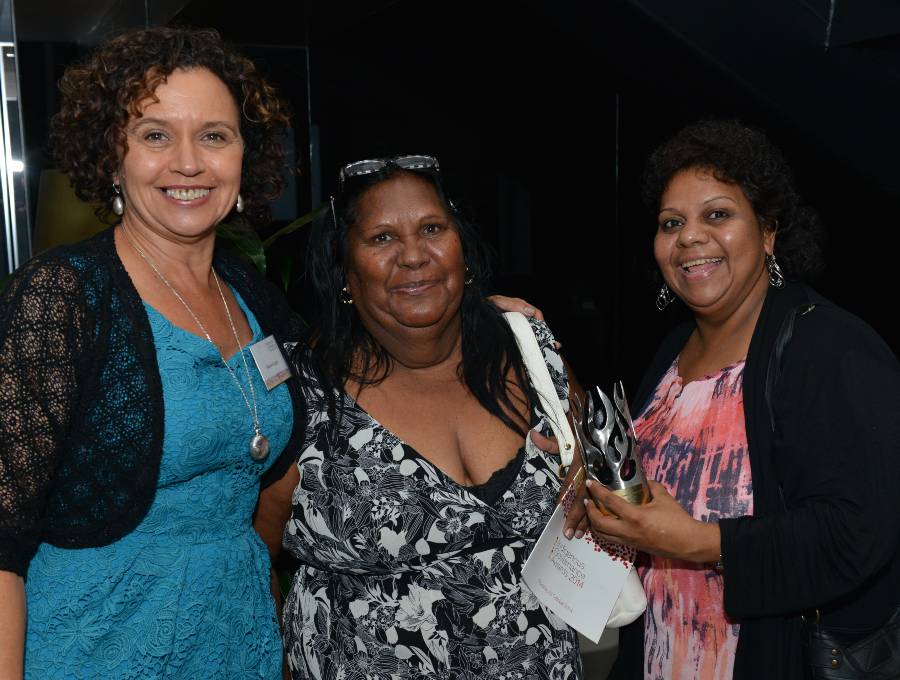Winners: Category A
Joint Winner – Institute for Urban Indigenous Health
Responding to the health gap between Indigenous and non-Indigenous peoples in South-East Queensland, the Institute for Urban Indigenous Health Ltd (IUIH) was established. Based in Brisbane, the IUIH came into fruition in 2009 and has been growing ever since. IUIH’s philosophy is ‘further, faster, better’ and has exemplified this throughout their practice.
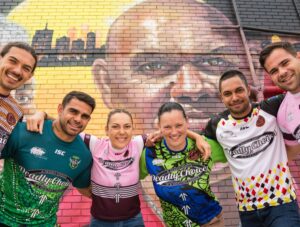
IUIH have been able to make the biggest single health impact of any Indigenous organisation in Australia, in the shortest time period, and with a national best practice standard of care. Currently, with a total of 35,000 clients, IUIH has grown by 340% since its conception.
Joint Winner – Nyamba Buru Yawuru
Based in Broome, Western Australia, Nyamba Buru Yawuru (NBY) is a not-for-profit company owned by the Yawuru Native Title holders through a corporate group structure. Working alongside the Yawuru Registered Native Title Body Corporate (PBC) and the Murra Malla Yawuru, the NBY develops economic, cultural and social sustainability for the Yawuru people to enjoy their land, values, community and culture.
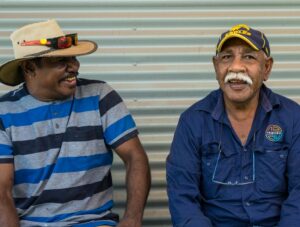
Incorporating the Yawuru language in daily activity at the workplace, the NBY philosophy ‘making Mabu Liyan real for all, always” refers to the interconnectedness between the individual and their country, culture and community. NBY have a leading role in the community, particularly when it comes to leadership and encouraging younger Yawuru people to take on these positions, and ‘step up’.
“There is no doubt that this high proportion of Yawuru people showing leadership and making decisions for the benefit of their community is empowering and indicates increasing governance capacity for Indigenous peoples.”
Winners: Category B
Warlpiri Education and Training Trust
Established in 2005, the Warlpiri Education and Training Trust (WETT) is an Aboriginal-controlled initiative to improve the education and training outcomes in four Yapa (Warlpiri-speaking) communities of the Tanami Desert.
The members of the WETT Advisory Committee monitor and develop programs and partnerships that promote bilingual and bicultural education and lifelong learning.
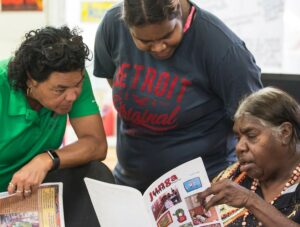
The Committee advises the Trust about investing its gold mining royalty income in training and education programs that support Yapa education priorities.
Its vision is for Yapa to be strong in their knowledge of culture, country and language, to be strong role models for future generations, and to stand up for our communities. They want their voices to be heard, and to have the same opportunities as everyone else. They want good roles and jobs, for their people today and for generations to come.
Finalists: Category A
Kuruma Marthudunera Aboriginal Corporation – KMAC
Based in Karratha, Western Australia KMAC’s vision is to work together as a community to establish a solid foundation towards independence, community wellbeing and cultural identity now and for future generations.
KMAC works as the Corporate Identity for the Robe River Kuruma (RRK) people.
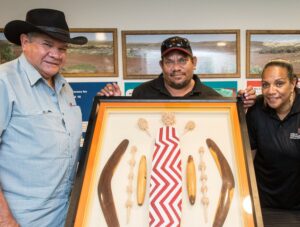
The Robe River Kurama people’s traditional rights extend across 16,000 square kilometres in the Pilbara region. KMAC won the 20+ year court case for the Native Title Determination; a testament to their leadership and self-determination.
“KMAC holds its community at the core of the Corporation’s governance structures, processes and policies, ensuring it is community led, controlled and championed.”
Marr Mooditj Training Aboriginal Corporation
In 1983, Dr. Joan Winch established the Marr Mooditj Foundation to provide health worker training for Aboriginal people in Western Australia. Marr Mooditj, meaning ‘good hands’ or ‘healing hands’, was named by Elder Jack Davis in 1984. Now in 2018, Marr Mooditj has continued to expand and develop accredited courses and added national qualifications to meet the needs of the community in health, mental health, community services, hospitality, phlebotomy, alcohol and other drugs.
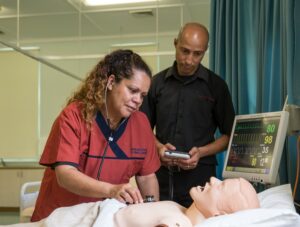
Marr Mooditj has continued to expand and develop accredited courses and added national qualifications to meet the needs of the community in health, mental health, community services, hospitality, phlebotomy, alcohol and other drugs.
Marr Mooditj has won three WA Training Excellence Awards; two Indigenous Business Awards and one National Training Award. They have trained and graduated just under 1000 students who have gone on to provide services and support within their communities.
“We believe we have created an environment in which Aboriginal and Torres Strait Islander people feel empowered to learn and develop their skills and achieve those goals of sustainable employment and healthy communities.”
Yamatji Marlpa Aboriginal Corporation
Yamatji Marlpa Aboriginal Corporation (YMAC) is the Native Title representative body for the Traditional Owners of the Pilbara, Murchison and Gascoyne regions of Western Australia. YMAC is a not-for-profit organisation run by an Aboriginal Board of Directors from across these areas. YMAC provides a range of services to its members including claim and future-act representation, heritage protection services, community and economic development and natural resource management.
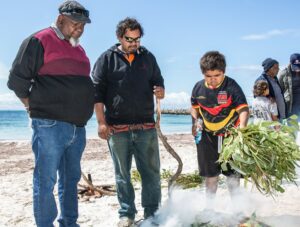
The organisation represents 24 different Aboriginal Traditional Owner groups, each with their own distinct country, culture and identity. These living cultures are maintained though languages, ceremonies, beliefs, music, art, laws and creation stories. YMAC’s representative area covers more than a third of WA, with offices in Geraldton, Hedland, Broome and Perth. Over the past two years, YMAC has achieved ten native title determinations for stakeholders.
“Yamatji Marlpa Aboriginal Corporation strives for equal opportunity and diversity in employment.”
Quandamooka Yoolooburrabee Aboriginal Corporation
Traditionally owned and led organisation, Quandamooka Yoolooburrabee Aboriginal Corporation (QYAC) was established in 2011, to manage the recognised Native Title Rights and interests of the Quandamooka people (under the Native Titles Act, 1993). A core part of QYAC’s business is to gather sustain, share and grow the traditional and modern knowledge of the Quandamooka’s care for their country.
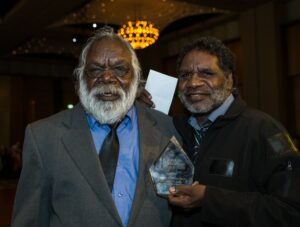
Quandamooka Country comprises the waters and lands of and around Moorgumpin (Moreton Island), Minjerribah, the Southern Moreton Bay Islands, and South Stradbroke Island.
It includes the mainland from the mouth of the Brisbane River, Wynnum, Chandler, Lytton, Belmont, Tingalpa, south to Cleveland, to the Logan River. Quandamooka Country crosses the boundaries of four Queensland local governments.
“QYAC reflects the Traditional Decision Making Process which is underpinned by kinship and family centred decision making.”
Finalists: Category B
Highly commended – Alekarenge Community Development Working Group
Traditional Owners and residents in Alekarenge, a community 400 kilometres north of Alice Springs, work together to make decisions about the community’s income. Group members plan and implement projects that benefit families from four language groups. Their initiative is about Aboriginal people in Alekarenge controlling their own resources and investing them in projects that help their community.
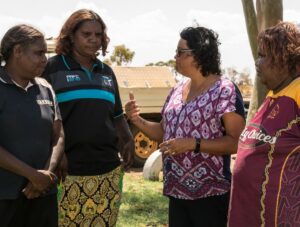
Since 2012 the group has used the community’s leasing and compensation income for initiatives that support its young people in particular.
Working with a range of project partners, the group has funded youth media employment and training and school holiday initiatives, as well as sports facility upgrades and traditional dance festivals.
CAYLUS Utopia Project
With a total of 80 members – all Indigenous, the CAYLUS Utopia Project endeavours to support local people in developing and shaping services for young people and families within their local, Utopian community. The project was established in 2015 and since its conception, seven key objectives have been identified:
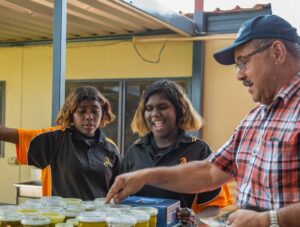
- School attendance
- Better communication skills and services between local citizens and agencies/government
- Health and early development of infants
- Awareness of local youth – providing services and activities to ensure they are safe and staying out of trouble
- A sense of ‘working together’ and unity between local and external organisations
- Higher employment rates for local people
- An urgency for these objectives to be achieved quickly.
“Culture is core to the way this project runs.”
Watch
Learn more about each of the 2018 finalists’ stories through their videos.
Previous awards
Take a look at the winners and finalists from previous Indigenous Governance Awards
The Indigenous Governance Awards 2020 were postponed due to the pandemic.

